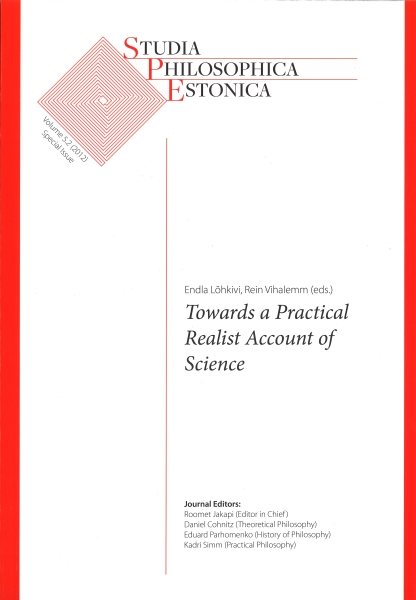Epistemic Injustice in Research Evaluation: A Cultural Analysis of the Humanities and Physics in Estonia
DOI:
https://doi.org/10.12697/spe.2012.5.2.08Keywords:
epistemic injustice, research cultures, aims and values in research practice, evaluationAbstract
This paper explores the issue of epistemic injustice in research evaluation. Through an analysis of the disciplinary cultures of physics and humanities, we attempt to identify some aims and values specific to the disciplinary areas. We suggest that credibility is at stake when the cultural values and goals of a discipline contradict those presupposed by official evaluation standards. Disciplines that are better aligned with the epistemic assumptions of evaluation standards appear to produce more "scientific" findings. To restore epistemic justice in research evaluation, we argue that the specificity of a discipline's epistemic aims, values, and cultural identities must be taken into account.
References
Adler, N. and Harzing, A. (2009). When knowledge wins: Transcending the sense and nonsense of academic rankings, The Academy of Management Learning and Education 8: 72-95.
Baneyx, A. (2008). “Publish or Perish” as citatio nmetrics used to analyze scientific output in the humanities: International case studies in economics, geography, social sciences, philosophy and history, Archivum Immunologiae et Therapiae Experimentalis 56: 363-371.
Chubin, D. E. and Restivo, S. (1983). The ‘mooting’ of science studies: Research programmes and science policy, in K. Knorr-Cetina and M.Mulkay (eds), Science Observed: Perspectives on the Social Study of Science, SAGE, London, pp. 53-83.
Fricker, M. (1998). Rational authority and social power. Towards a truly social epistemology, Proceedings of the Aristotelian Society 98: 159-177.
Fricker, M. (2007). Epistemic injustice: Power and the ethics of knowing, Oxford University Press, Oxford.
Fuchs, S. (1992). The Professional Quest for Truth: A Social Theory of Science and Knowledge, State of New York University Press, Albany.
Giere, R. N. (1988). Explaining Science: A Cognitive Approach, University of Chicago Press, Chicago.
Hasse, C. and Trentemøller, S. (2008). Break the Pattern! A critical enquiry into three scientific workplace cultures: Hercules, Caretakers and Worker Bees, Tartu University Press, Tartu.
Hasse, C. and Trentemøller, S. (2009). The method of culture contrast, Qualitative Research in Psychology 6: 46-66.
Hasse, C. and Trentemøller, S. (2011). Cultural workplace patterns in academia, Science Studies: An Interdisciplinary Journal for Science and Technology Studies 24: 6-25.
Hemlin, S. and Gustafsson, M. (1996). Research production in the arts and humanities, Scientometrics 37: 417-432.
Longino, H. E. (1990). Science as Social Knowledge. Values and Objectivity in Scientific Inquiry, Princeton University Press, Princeton.
Longino, H. E. (2002). The Fate of Knowledge, Princeton University Press, Princeton.
Richardson, A. W. (1998). Carnap’s Construction of the World: The Aufbau and the Emergence of Logical Empiricism, Cambridge University Press, Cambridge.
Rolin, K. (2004). Why gender is a relevant factor in the social epistemology of scientific inquiry, Philosophy of Science 71: 880-891.
Ross, J. (2012). Raamatud, humanitaarteadused ning Eesti teadusbÜrokraatia, Akadeemia 24: 2265-2271.
Rossiter, M. (1995). Women Scientists in America: Before Affirmative Action, Johns Hopkins University Press, Baltimore.
Rouse, J. (1987). Knowledge and Power: Toward a Political Philosophy of Science, Cornell University Press, Ithaca.
Rouse, J. (1996). Engaging Science: How to Understand its Practices Philosophically, Cornell University Press, Ithaca.
Suppe, F. (1989). The Semantic Conception of Theories and Scientific Realism, University of Illinois Press, Urbana.
Traweek, S. (1992). Border crossings: Narrative strategies in science studies and among physicists in Tsukuba Science City, Japan, in A. Pickering (ed.), Science as Practice and Culture, University of Chicago Press, Chicago, pp. 429-465.
Velbaum, K., Lõhkivi, E. and Tina, M.-L. (2008). UPGEM national report: Estonia, Draw the Line! Universities as workplaces for male and female researchers in Europe, Tartu University Press, Tartu, pp. 137-212.
Wenneras, C. and Wold, A. (2001). Nepotism and sexism in peer-review, in M. Lederman and I. Bartsch (eds), The Gender and Science Reader, Routledge, London, pp. 42-48.
Wylie, A.( 2011). What knowers know well: Women, work and the academy, in H. Grasswick (ed.), Feminist Epistemology and Philosophy of Science: Power in Knowledge, Springer, Dordrecht, pp. 157-179.





